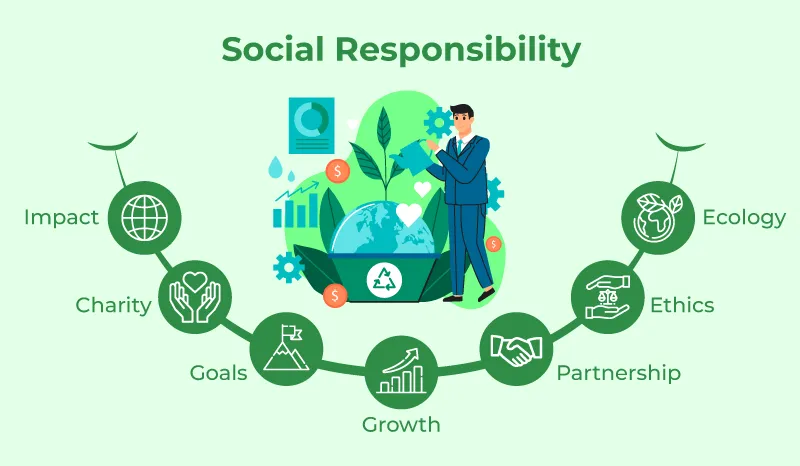
In most highly developed countries, contributions and donations made towards causes like education and health are not considered philanthropic acts but are imbedded in the culture as mandatory and ethical obligations for the betterment of society at large.
Charitable works
In all their charitable works, large business houses are consciously aware of three main factors. First, that they are under obligation to society at large to train essential human resources for enterprises who employ a large number of engineers and other skilled workers. This human resource must have completed graduation from good universities, colleges, and vocational schools. Therefore, enterprises must retain a part of their revenue for training and preparing this large volume of human resource. Since training human resource requires a constant cash flow, enterprises plan their funds and revenue to cover this need.
Second, the products that the concerned enterprises usually make are from natural resources available within or outside their country, with the enterprises holding a monopoly and right to exploit these resources to create their products. Although enterprises pay all the taxes for exploiting the required resources, they also enjoy the rights that others do not have and in turn hold a huge surplus supply. Therefore, contributions to society are considered by enterprises as a process for income equity.
Third, production enterprises must cover all costs for causing tangible and intangible harm to society through their ventures. For instance, when society is harmed by pollution, emitting of smoke, noise, toxins, and other such waste. The production industries rake in huge profits but also cause great harm such as when they produce more tobacco, alcohol, and carbonated soft drinks. Although the damage is not immediately visible, there exists long-term stress, distorted attitudes, and wrong perceptions. To sum up, all such production enterprises must pay for creating all these social damages.
These damages must be covered through periodic renumerations to the government according to the law. This may amount to about 0.2% to 0.5% of profit of each enterprise, depending on the conditions and circumstances within each country. The government can then use these renumerations for training institutions, as well as for necessary health and social welfare.
Besides, enterprises themselves can build educational development funds such as awarding scholarships to graduate students; fund scientific research programs; set up annual scientific research awards; or fund the development of facilities such as laboratories, libraries, and sports centers. The government can also fix an annual rate of revenue to fund education, which is an essential criterion for the development of human resource. Funds can also be used in unexpected circumstances such as when students were affected by the Covid-19 pandemic.
Enriching society
Currently, some businesses choose to pay money to support causes, but most businesses choose to sponsor through different programs because they will receive many benefits in return. Firstly, it will create an impressive image of such enterprises and their products in the marketplace and in the minds of people in general. When talking about these enterprises, people do not just talk about their success and products but also mention their philanthropic social activities. These businesses are respected by society and their goods are often chosen by consumers.
Secondly, these businesses get the attention of good and qualified managers, as also the support of political leaders who are willing to help. The world economic crisis showed that when credible companies faced difficulties, banks were willing to reach out to help them to keep afloat, while leaders found ways to resolve their issues to overcome difficulties. Thirdly, these enterprises are entitled to tax exemptions, tax breaks, and tax arrears because the government considers their contribution to social development as an encouraging achievement.
Fourthly, these enterprises have over the years established close relationships with universities and research institutes. Through this two-way relationship they can order training schools and institutes to meet their needs, and conversely, training institutions also accommodate more students for future requirements.
Fifthly, employees of corporations and companies directly participate in sponsorship and support programs for education and become more mature in social awareness and community sharing. They participate in building schools, distributing books and school supplies. They hand out equipment and essential materials to children in remote areas, and also receive valuable lessons in humanity. Such trips bring many benefits to the company such as solidarity, practical skills, and better local relationships. The fact that enterprises contribute to society gives employees in the company a genuine sense of pride, which boosts their well-being among all business members.
Public relations
Currently in Vietnam there are many business houses doing a lot of excellent social work, such as the Lawrence S.Ting Foundation, Vingroup, Foundation of FPT, and Phuc Khang. However, the number of businesses doing non-profit social work are not too many and are focused more on improving public relations such as giving favors or doing charity work. There are businesses that give schools occasional gifts but ask that the receivers put big logos and mobilize a strong team of reporters to publicize their donations. There are many businesses doing social work for political purposes in this style.
Referring to responsibility to society, Mr. Phan Chánh Dưỡng, director of the Lawrence S.Ting Foundation, said that if one earns money, one must also share it with others. Hence, it is time for the State to make contributions for education and health by enterprises into law. Businesses also need to realize that contributing towards social development is not only an obligation and responsibility but also an entrepreneurial duty which comes from the heart and the desire to share with their fellow beings.




















